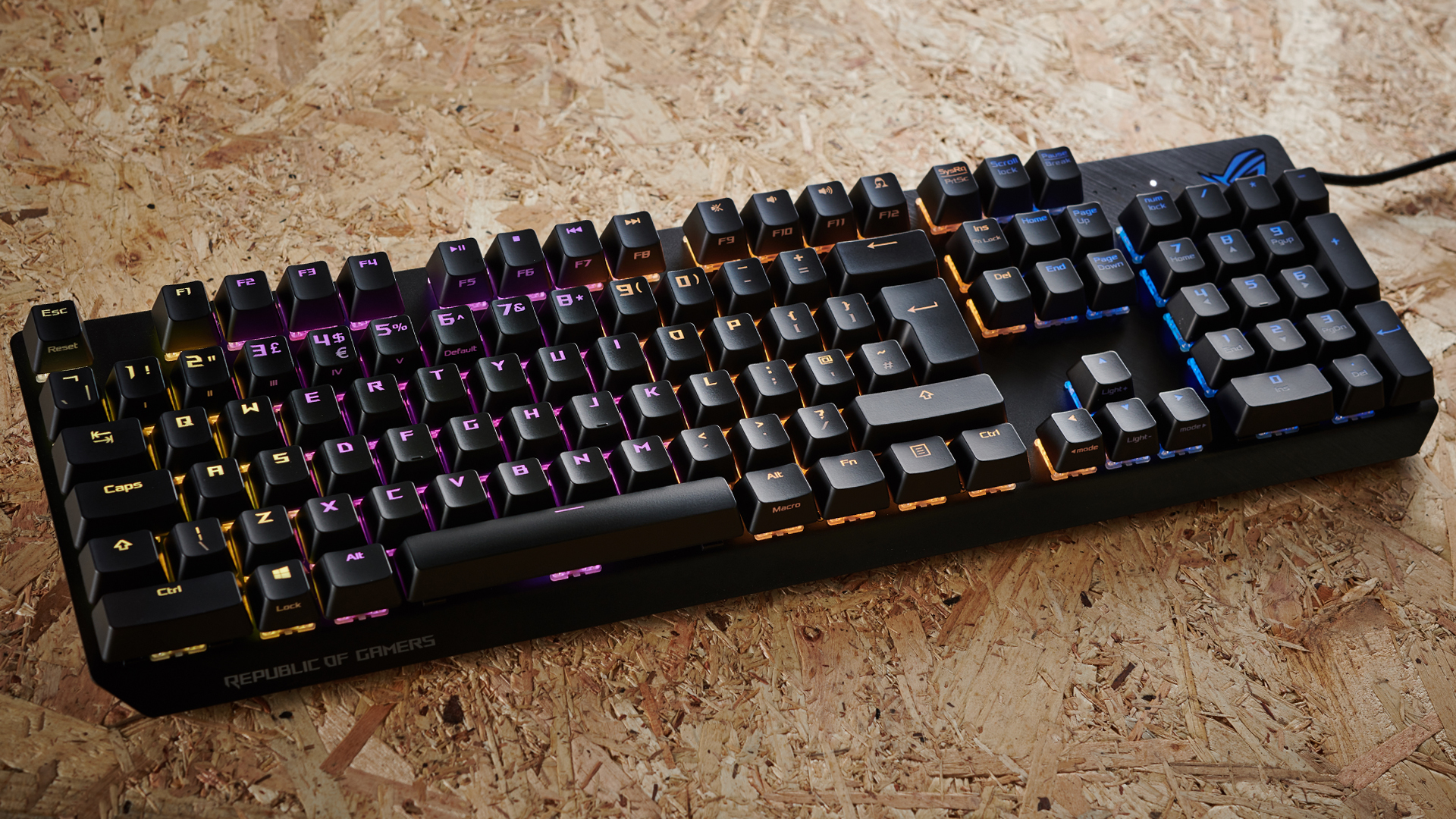TechRadar Verdict
The Asus ROG Strix Scope is an effective mechanical gaming keyboard that focuses on the essentials, rather than dazzling potential buyers with superfluous features. It’s a gamble that pays off.
Pros
- +
Solid build quality
- +
Responsive
- +
Nice design
- +
Decent price
Cons
- -
No wrist rest
- -
Software isn’t great
Why you can trust TechRadar
Gaming keyboards, like the Asus ROG Strix Scope, come in all shapes and sizes, from sublime designs that get straight to the point, to over-the-top devices with loads of additional buttons and features that aim to give you the competitive edge when you play.
The Asus ROG Strix Scope is one of the former: a gaming keyboard that sticks to the basics. That’s no bad thing, as by concentrating on what really matters, Asus has the potential to deliver a solid and dependable mechanical gaming keyboard that nails the essentials.
In our view, a gaming keyboard needs to be reliable, responsive and feel great to use. If Asus gets this right with the ROG Strix Scope, then it’s on to a real winner.
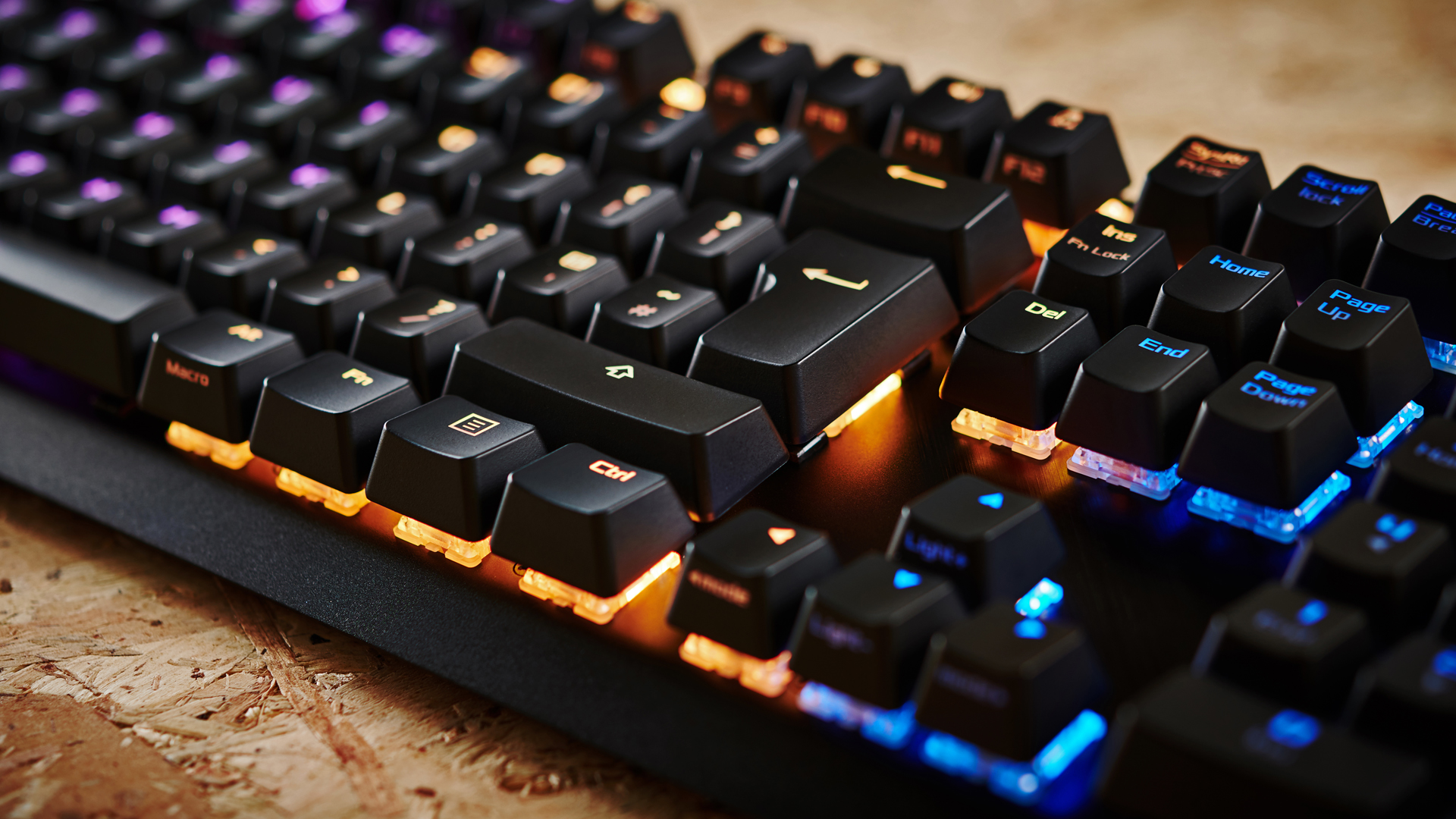
Price and availability
The Asus ROG Strix Scope sells for $170 (£150, around AU$240), which puts it in the same price bracket as the excellent Roccat Vulcan 120 Aimo, which currently sits at the top of our best keyboards guide.
It’s not the cheapest gaming keyboard in the world – but then neither is it the most expensive. Considering the features it comes with, such as mechanical switches and RGB lighting, we think the price is pretty much spot on.
However, as we mentioned earlier, its price puts it in direct competition with the Vulcan 12 Aimo, which means it has its work cut out for it.
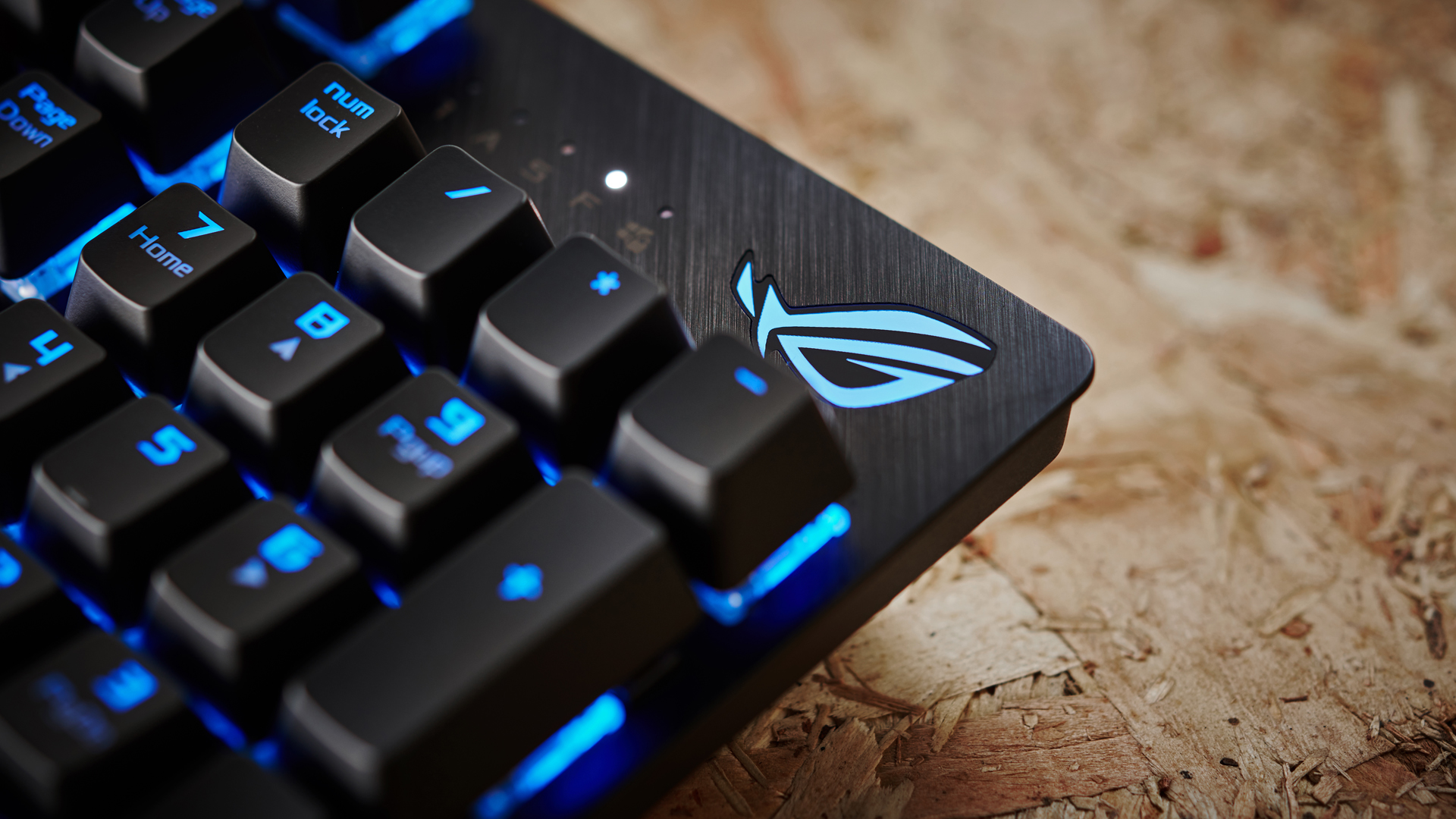
Design
At first glance, the design of the Asus ROG Strix Scope is rather understated. Despite being a full-size keyboard with the numpad included, the overall size of the Asus ROG Strix Scope’s body is kept impressively compact at 17.32 x 5.39 x 1.53 inches (440 x 137 x 39mm). This is thanks to the fact that there’s barely any space between the edges of the keyboard and the keys that run alongside the top, bottom and sides.
The lack of wasted space – as well as the absence of additional configurable keys – helps keep the Asus ROG Strix Scope down to a manageable size, without it feeling cramped or uncomfortable. Its compact size means you can comfortably carry it around with you if you want to bring your trusted keyboard with you while you travel – for example, if you’re a member of an esports team.
However, it does mean that the Asus ROG Strix Scope doesn’t come with a wrist rest, unlike other keyboards at this price range. Wrist rests can make a big impact on the comfort of using a keyboard for long periods of time, so you may find you end up buying one anyway.
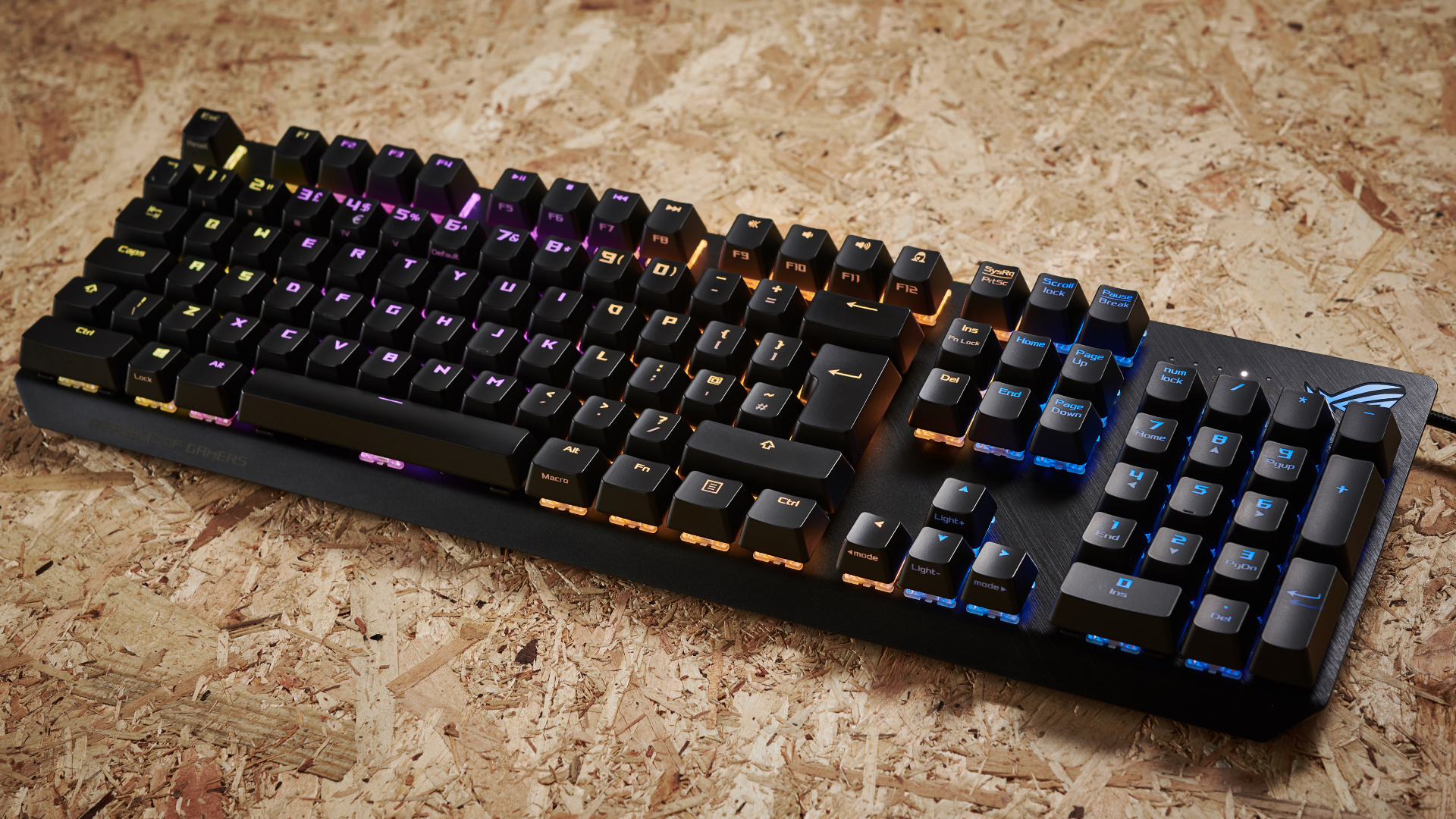
Although the design is one of the most simple we’ve seen with a gaming keyboard, it doesn’t mean the Asus ROG Strix Scope looks boring. The keyboard has an attractive style with two textures – a design motif found on other ROG Strix products.
The RGB lighting also leaves you in no doubt that this is a keyboard aimed at gamers, and it can be configured with Asus’s Aura Sync software – which also means it can be synchronized with compatible devices. If you’ve got a load of Asus ROG devices, then your desktop could be awash with synchronized colors.
While the Asus ROG Strix Scope doesn’t have dedicated keys for media playback and the like, the function keys at the top of the keyboard (F1 to F9) have secondary features that can be toggled while pressing the Fn key.
Other gaming-centric design choices include extra WASD keys that come in a silver color, and allow you to replace the standard WASD keys, so they are easier to locate. There’s also a wider than usual Ctrl button, which makes hitting the regularly-used key easier in frantic gaming sessions.
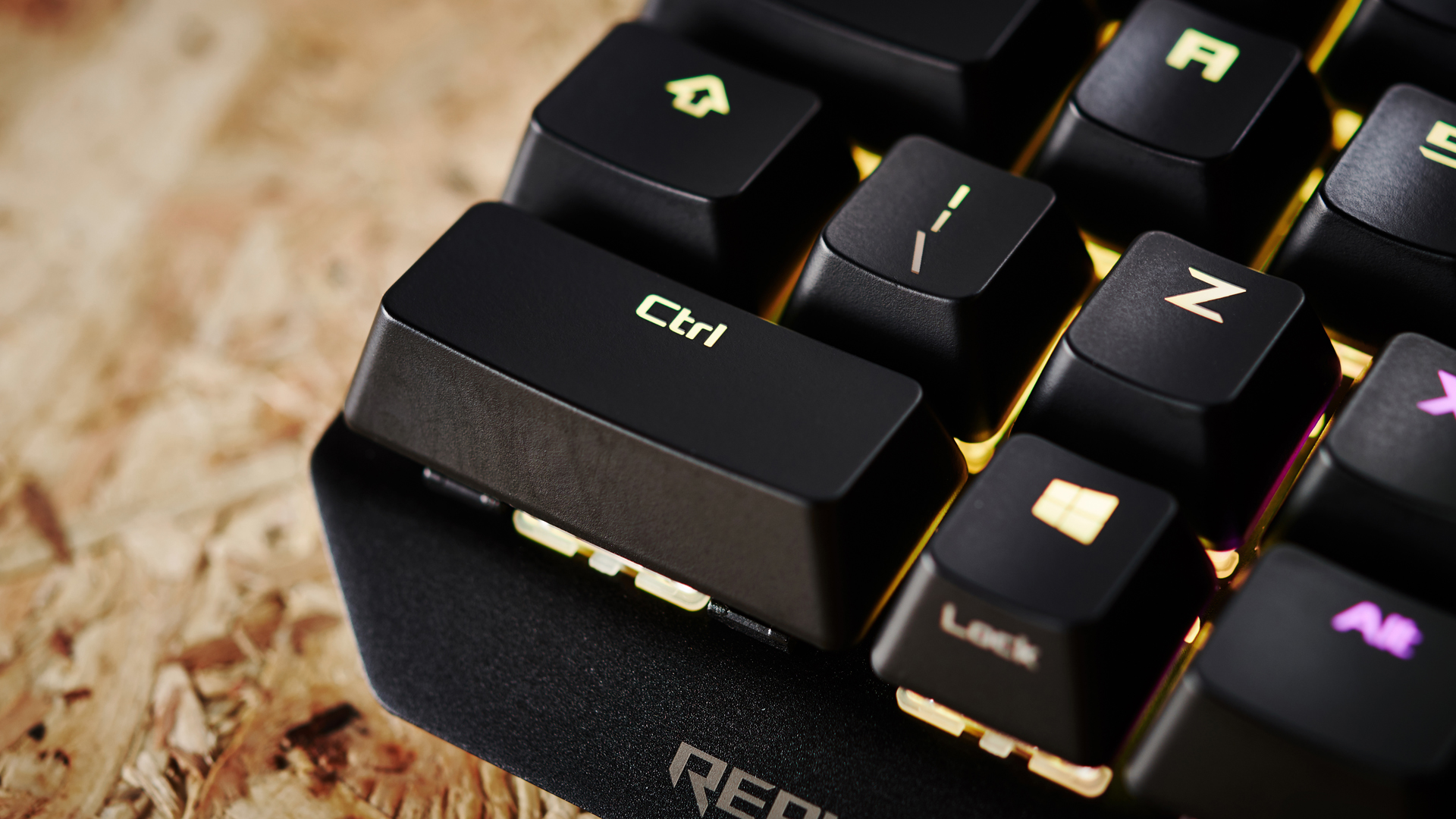
The F12 button also doubles as a ‘Stealth’ key. Pressing it instantly mutes audio and hides all apps, which Asus claims gives you quick and easy privacy. We’ll leave it up to your imagination about what this key will mainly be used for.

Performance
The Asus ROG Strix Scope comes by default with Cherry MX Red switches, which offer a good balance of tactile responsiveness, low noise, and a satisfying feel. However, unlike many other mechanical keyboards, you can choose other Cherry MX switches at checkout: Brown, Blue, Black, Speed Silver and Silent Red.
This gives you greater choice and lets you configure the Asus ROG Strix Scope to fit your play style and preference.
When using the Asus ROG Strix Scope for day-to-day use, such as typing, the keyboard feels comfortable to use, while the Cherry MX Red Switches feel comfortable and responsive. It’s also a bit quieter to type on than other mechanical keyboards we’ve tested, but it still has that satisfying ‘click’ when you press down on the keys.
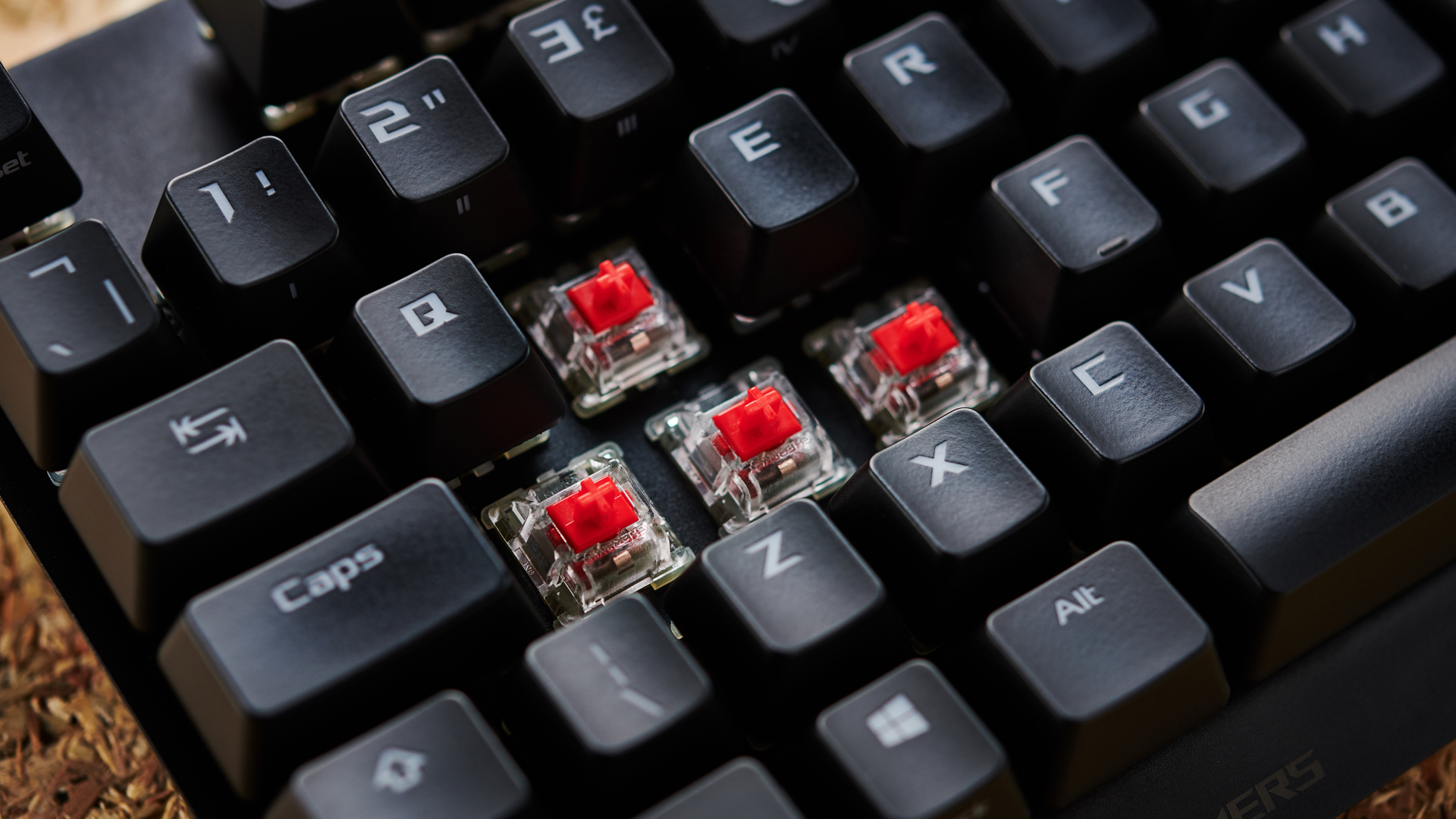
This responsive and tactile feel to the Asus ROG Strix Scope translates well to gaming, where the keyboard easily keeps up with our frantic tapping as we play. The solid build quality that we’ve come to expect from Asus’s gaming peripherals further enhances the feel of the keyboard as we played.
We like to keep things simple when playing, so we didn’t miss the additional macro buttons while using the Asus ROG Strix Scope during games – in fact, we sometimes find keyboards that come with loads of extra buttons to be a bit distracting.
If you do want to assign macros – or configure the keyboard – you can do so using the Asus ROG Armoury software, which will also help you configure any other compatible ROG devices. Unfortunately, we’re not huge fans of the software, with the interface guilty of the cardinal sin of being both simplistic and confusing at the same time. While configuring the lighting effects is easy enough, configuring keys and macros is a frustrating experience.
Luckily, you can record and assign macros on the fly using keyboard shortcuts, rather than having to trudge through the software.
Software issues aside, the Asus ROG Strix Scope is an excellent performer when it comes to games, giving you a straightforward, yet dependable, experience that feels fast and responsive, while also being comfortable.
Final verdict
There’s a lot to like about the Asus ROG Strix Scope’s simplicity. The lack of additional buttons and overly-fancy design means you get a compact keyboard that nails the basics. It feels comfortable to use, is responsive when playing even the most frantic games, and there’s a few nice gaming-centric features as well.
Just because the design is understated, it doesn’t mean the keyboard looks boring. Plus, if you have other Asus Aura-compatible glowing peripherals, the Asus ROG Strix Scope will fit right in.
However, the Asus ROG Strix Scope does lack a few features that similarly priced keyboards feature, and the design pales in comparison with the Roccat Vulcan 120 Aimo.
Still, if you’re invested in the Asus ROG peripheral ecosystem, or are just looking for a no-nonsense mechanical gaming keyboard that has a bit of design flair, then the Asus ROG Strix Scope is an excellent choice.
Image credits: TechRadar

Matt is TechRadar's Managing Editor for Core Tech, looking after computing and mobile technology. Having written for a number of publications such as PC Plus, PC Format, T3 and Linux Format, there's no aspect of technology that Matt isn't passionate about, especially computing and PC gaming. He’s personally reviewed and used most of the laptops in our best laptops guide - and since joining TechRadar in 2014, he's reviewed over 250 laptops and computing accessories personally.
